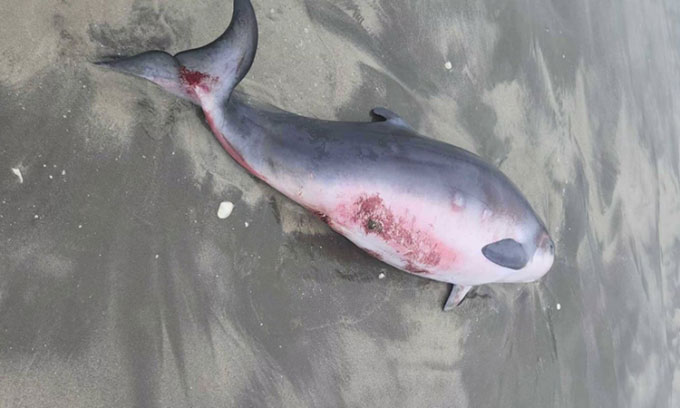5m great white shark grabs the head of a stranded sperm whale
A shark kills a mother pygmy sperm whale stranded in Māhia Bay, leaving the calf alone on the beach .
A massive shark grabbed the head of a pygmy sperm whale in New Zealand while rescue workers stood in waist-deep seawater trying to push the whale back into the ocean, according to Live Science . The animal, suspected to be a great white shark ( Carcharodon carcharias ), returned 30 seconds later to feed on the whale carcass, witnesses said. The accident happened in Hawke's Bay on the Māhia Peninsula after a pygmy sperm whale ( Kogia breviceps ) and her calf became stranded on the beach.

A young pygmy sperm whale was injected with euthanasia for scientific research. (Photo: Hawke's Bay Today).
Chad Prentice, police officer in charge of the Māhia area, shared that the shark was more than 5 meters long and killed the pygmy sperm whale instantly. "The witness said the shark first hit the pygmy sperm whale, then rose out of the water and bit off its head. Not many sharks can do that," Prentice said.
The mother pygmy sperm whale that was killed was 3 meters long. While the rescue worker ran to shore uninjured, the shark swam away with its prey, turning the sea water red. The young pygmy sperm whale remains stranded after the attack without its mother. Finally, the authorities had to inject it with euthanasia and research to find out the cause of the stranding.
New Zealand is famous for marine mammal strandings. Usually, 1 - 2 animals get stuck in shallow water, but sometimes large herds get stranded together. The largest mass stranding in the country's history occurred in 1918, including 1,000 pilot whales, according to the New Zealand Department of Conservation (DOC). Many stranded marine mammals become ill when washed ashore, but many factors may exist that lead to the event and researchers still have much to learn about the phenomenon.
DOC warned of increased shark activity around Māhia Bay in January after 45 killer whales and bottlenose dolphins became stranded and had to be euthanized. Some shark species eat whales and dolphins, including their carcasses, and may be attracted to stranding areas. These species include sevengill sharks, blue sharks, tiger sharks and white sharks, according to Clinton Duffy, DOC technical advisor. Daren Grover, manager of the marine mammal charity Project Jonah, said it was common for sharks to prey on sick animals because they were opportunistic feeders.
- 6-meter white shark tore the whale's body in front of the bow
- Female whale shark is a
- White sharks were chased to death, the culprit this time was not human
- Amazing discovery of the sex life of the
- Scattering fears for great white sharks
- Identify the 'strange' fish weighing 2 tons in Quang Tri
- Big sharks eat small sharks
- The mystery of the incredible sex life of white sharks
- White whale stranded in the Seine
- Divers are frightened because the sperm whale fires like a bomb exploding
- Giant white sharks swim 2370km from the Canadian coast to the United States
- Sharks in Binh Dinh are special resources
 Surprised: Fish that live in the dark ocean still see colors
Surprised: Fish that live in the dark ocean still see colors Japan suddenly caught the creature that caused the earthquake in the legend
Japan suddenly caught the creature that caused the earthquake in the legend A series of gray whale carcasses washed ashore on California's coast
A series of gray whale carcasses washed ashore on California's coast Compare the size of shark species in the world
Compare the size of shark species in the world